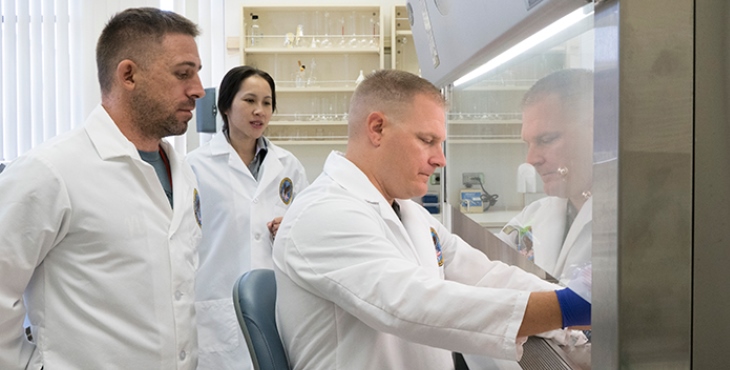In addition to having the same first name, Nick Mezak and Nick McMenomy both served their country in the Marines. In fact, they spent time together in a Marine expeditionary unit in Japan, Singapore, and the Philippines, and depended on each other “countless times,” as one of them put it.
They have other things in common, too.
For one, both have experience conducting research in the lab of Dr. Ngan Huang, a biomedical engineer at the VA Palo Alto Health Care System in California. The research is centered on cardiovascular tissue engineering, a way of creating artificial pieces of blood vessels and heart tissue using bioengineering principles. The goal is to build a biological heart with human stem cells, a feat the medical community has been striving for to offset the shortage of donated organs and assist those in need of a transplant.
Mezak, 32, has interned in the lab for more than three years. He has pursued research that involves creating three-dimensional scaffolds that organize the structure of engineered tissues.
McMenomy, 34, has worked in the lab since June as a summer intern under a U.S. Department of Education science and engineering program. He has collaborated with Mezak on the creation of three-dimensional scaffolds.
Grateful for the opportunity
“It has allowed me to work alongside and learn from some of the most gifted and passionate scientists in the country,” Mezak says. “Dr. Huang has structured her lab so that all members work as a team and stay involved in many different projects. The insight from working in the lab has brought a lot more value and practical understanding of my coursework as a bioengineering student.”
McMenomy finds the experience even more fulfilling because of the chance to develop a treatment that could benefit those who, like himself, once served.
“Nick [Mezak] and I are truly dedicated to helping the doctors in the lab be successful in any way we can, and hopefully we can help save someone’s life someday,” he says. “The fact that we might be able to save a fellow Veteran’s life makes our research all the more important to us.”
Click here to read the rest of the story on VA Research Currents site.
About the author: Mike Richman is a writer and editor for VA Research communications.
Topics in this story
More Stories
In a new series that highlights advancements in VA health care, VA researchers and clinicians are appearing on a Veteran-themed media platform—Wreaths Across America Radio—to tout their critical work.
Recently published findings from the VA Disrupted Care National Project [...]
Diverse representation of women in health care research allows MVP to make discoveries for women’s health






